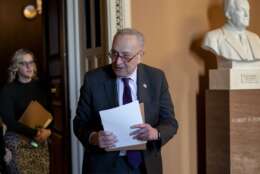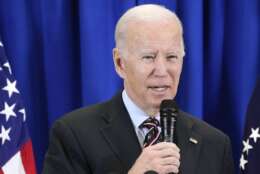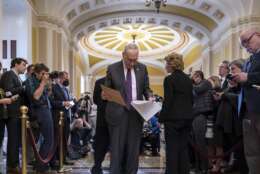National & World Headlines
-
You might think chief financial officers count beans and leaf through spreadsheets. But their profession needs training, skills development, and innovation as much as anyone else. A project at the Office of Personnel Management sought to ensure financial people stay up to date.
January 04, 2023 -
President Joe Biden has signed a $1.7 trillion bill funding government operations through September 2023, the end of the federal budget year.
December 29, 2022 -
In today's Federal Newscast, the Federal Bureau of Prisons will have to overhaul its outdated security systems under legislation the president signed yesterday.
December 28, 2022 -
The new leader of Navy shipbuilder Bath Iron Works said he's been rejuvenated by a shift from his former aerospace job to building ships.
December 27, 2022 -
In today's Federal Newscast: Republican Senators urge Defense Secretary Austin to reinstate military members and to issue backpay for vaccine-related discharges. The personal information of more than 250,000 people possibly exposed in data breach. And L3Harris Technologies is buying Aerojet Rocketdyne for almost $5 billion.
December 20, 2022 -
President Joe Biden has signed legislation to fund the government for an additional week as lawmakers race to finish work on a full-year spending package before they head home for the holidays and a new Congress is sworn in. Congress in September passed a bill to keep the government running through midnight Friday. The latest extension funds federal agencies through Dec. 23. That will give lawmakers more time to fashion a roughly $1.7 trillion package currently being negotiated that would finance the day-to-day operations of government agencies for the full fiscal year.
December 16, 2022 -
President Joe Biden has visited a National Guard facility in Delaware to talk about expanded veterans benefits for exposure to toxins under legislation that he signed in August. The National Guard facility is named after his late son, Beau Biden, who served as a major in Iraq and later died of brain cancer. The president has said he believes his son's fatal illness stemmed from his exposure to “burn pits” in Iraq. The new law, known as the PACT Act, helps veterans get screened and treated for toxins that could include Agent Orange, which was used for deforestation during the Vietnam War, or burn pits, where trash was destroyed on military bases in Iraq and Afghanistan.
December 16, 2022 -
Lawmakers leading the negotiations on a bill to fund the federal government for the current fiscal year say they’ve reached agreement on a “framework” that should allow them to complete work on the bill over the next week and avoid a government shutdown.
December 14, 2022 -
Congress will likely have to fund the government for one week to avoid a partial government shutdown. That's according to Sen. Democratic Leader Chuck Schumer, who said Monday there are “positive and productive" conversations happening about a longer-term spending package. Congress faces a midnight Friday deadline to fund the government and prevent a partial stoppage. A vote to extend that deadline by one week gives negotiators more time, but also pushes back the deadline to Dec. 23, closer to the holidays. Lawmakers are hoping to attach an array of other priorities to the final spending bill, including $37 billion in Ukraine aid.
December 12, 2022 -
The COVID-19 vaccine mandate for members of the U.S. military would be rescinded under the annual defense bill heading for a vote this week in Congress. If the measure passes, it will end a policy that helped ensure the vast majority of troops were vaccinated but also raised concerns that it harmed recruitment and retention.
December 06, 2022 -
House investigators say a federal contractor that provided identity verification services for the Internal Revenue Service overstated its capacity to perform its services. The investigators say ID.me also made false claims about the amount of money lost to pandemic fraud in an apparent effort to increase demand for its services. The investigation of firm ID.me began in April after critics said the facial recognition software could become a target of cyberthreats and presented privacy concerns. A company representative says “calling ID.me’s estimate too high or baseless is premature, and we welcome additional oversight on this important matter."
November 17, 2022 -
The head of U.S. Customs and Border Protection has resigned from his job leading the nation’s largest law enforcement agency as agents encounter record numbers of migrants entering the U.S. from Mexico. Chris Magnus submitted his resignation to President Joe Biden on Saturday, saying it had been “a privilege and honor” to be part of the administration. Two people who were briefed on the matter told The Associated Press on Friday that Magnus was told to resign or be fired less than a year after he was confirmed. His removal is part of a larger shakeup expected at Homeland Security as it struggles to manage migrants coming from a wider range of countries, including Venezuela, Cuba and Nicaragua.
November 12, 2022 -
The U.S. Interior Department's plan to withdraw hundreds of square miles in New Mexico from oil and gas production for the next 20 years is expected to result in only a few dozen wells not being drilled on federal land surrounding Chaco Culture National Historical Park. Land managers on Thursday released an environmental assessment of the plan first outlined by Interior Secretary Deb Haaland in 2021 in response to the concerns of Native American tribes in New Mexico and Arizona. Environmentalists say the agency needs to take a broader look at the cumulative effects of development if they want to preserve cultural sites and limit pollution from ongoing development beyond the proposed withdrawal zone.
November 11, 2022 -
The head of U.S. Customs and Border Protection is being forced out of his job leading the nation’s largest law enforcement agency, according to two people familiar with the matter. Chris Magnus has been on the job less than a year. He was told to resign or be fired, according to two people with direct knowledge of the matter who were not authorized to discuss it publicly and Brandon Judd, president of the National Border Patrol Council. The ultimatum comes after Republican gains in midterm elections are likely to lead to more congressional scrutiny.
November 11, 2022 -
The U.S. is celebrating Veterans Day at a time when the nation is experiencing some of its lowest monthly veteran unemployment rates on record. The Bureau of Labor Statistics shows that the seasonally adjusted veteran jobless rate was 2.7% in October. Experts say the low numbers are due in part to the tight labor market. But they also credit significant efforts in recent years by the federal government and veteran service organizations to provide assistance to former service members. Leaving the military can be one of the most difficult transitions a person can make. The transformation sometimes takes years of working unfulfilling jobs, while finding a new purpose beyond serving one’s country.
November 11, 2022














